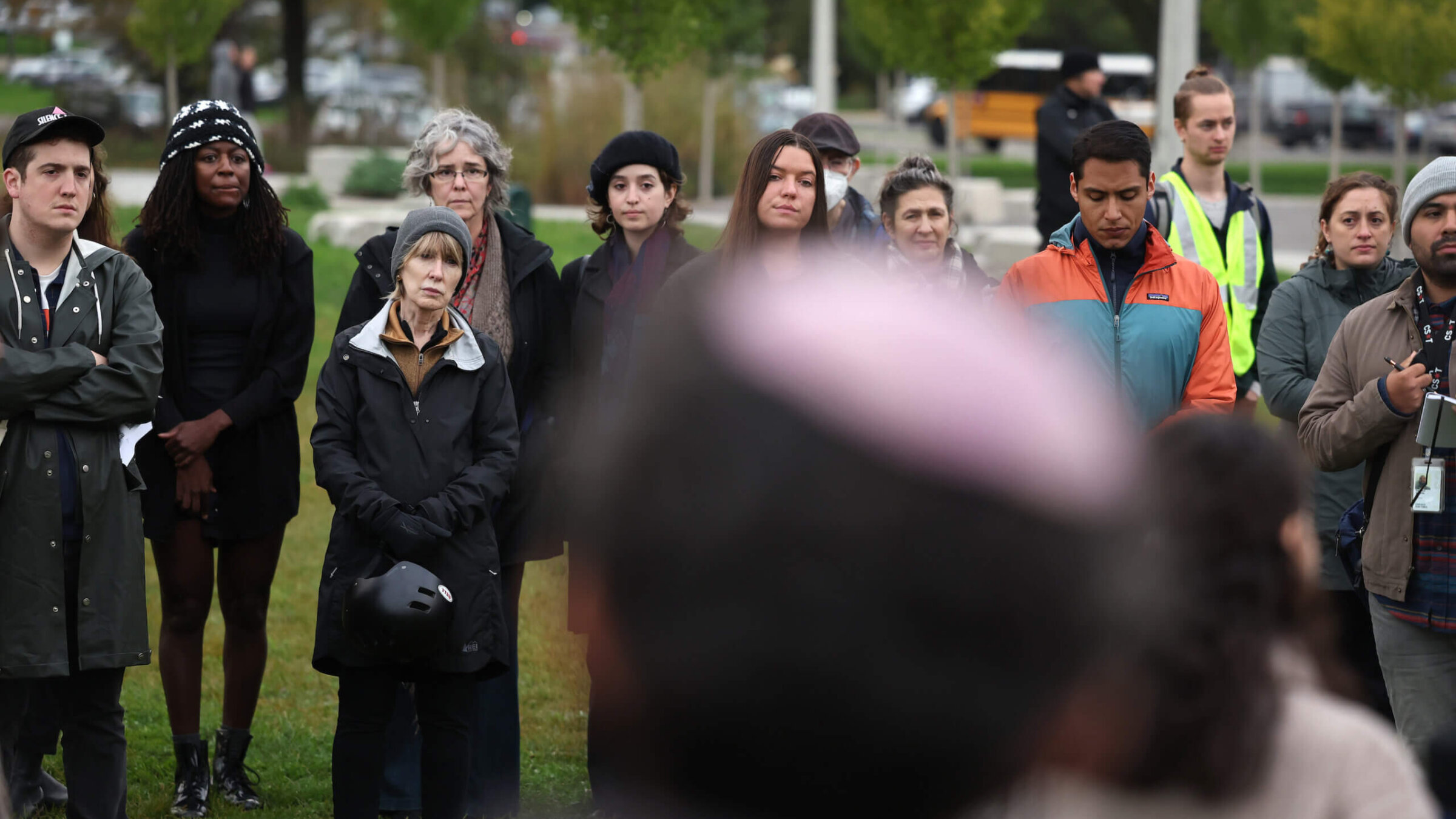Jews shaken by the attacks must remember that oppression and hate have never ended
‘I always feel like there’s a bright pink fluorescent target on my back’

Jews gather at a Chicago park to recite the kaddish and light candles to mourn the Palestinians and Israelis killed during recent fighting. Photo by Scott Olson/Getty Images
Two weeks after the Hamas attack in Israel, the shattered sense of safety felt by Jews around the world hasn’t gone away.
It’s the same ever-present insecurity felt by many people of color in the United States — including Jews of color.
“I always feel like there’s a bright pink fluorescent target on my back. I’m Black. I’m a woman. I’m Jewish,” said Debrosha McCants, a mother of grown children in Allentown, Pennsylvania.
The difference, she says, between Jews of color and Jews who appear white — or who have embraced whiteness — is that people of color can’t hide from racism.
“I often talk to white-passing Jews who say, ‘I don’t wear a kippah, I don’t want people to know I’m Jewish,’” McCants said. “Because I’ve been Black my whole life, I don’t have the privilege to hide who I am.
“To Jews who just walk through life,” she continued, “I say, ‘Well honey — welcome to my world.’”
McCants’ comments recall the aftermath of George Floyd’s murder, when Black people responding to the innocent question “How are you?” answered “I’m not OK.”
That answer is echoed by Jews in the current crisis.
“No, things are not OK,” said Harriette Wimms, a Maryland clinical psychologist and the convener of the Jews of Color Mishpacha Project. “Just as we had video footage of George Floyd begging for his life, we have video footage of the atrocities that happened.”
To those who might quickly discount the comparison of one man’s murder to the brutal massacre and kidnapping of hundreds, it wasn’t just Floyd’s death that Black people were reacting to back in 2020. Rather, it was the continuation of Black lives still not mattering, after years of police murders, lynchings and dehumanization dating back centuries.
The analogy doesn’t apply completely. When Black people said they weren’t OK, they weren’t saying everything was just fine before Floyd’s murder. It just took that atrocity for the rest of the world to finally ask.
Conversely, many Jews thought they had escaped the oppression of the past, until the attacks brought them back. For American Jews in particular, it was a reminder that comfort was illusory, belying the myth that each ethnicity would get its turn at full acceptance. First the Germans, then the Irish, then the Italians, the story goes. The Jews, Blacks and Hispanics would surely get theirs.
But it didn’t work that way. And even as white Jews were admitted to the club, antisemitism didn’t go away. In recent years, it’s even increased.
As for my personal ambitions for being admitted to the club, I’m reminded of a speech about the concept of “arriving” — achieving professional and financial success — by former U.S. Appeals Court Judge Alcee Hastings.
Speaking to a convention of Black journalists, he said, “If you’re Black in America, you never arrive.” Even for those on prestigious newspaper editorial boards, I recall him continuing, “You may think you’ve arrived. But before you entered the room, the decision was made. And after you left, it was changed.”
(Few people knew it at the time, but Hastings was just about to be impeached — for fabricating evidence and other infractions related to a bribery case in which he was acquitted — after which he was elected to Congress and served 28 years until his 2021 death. So he very much knew what he was talking about.)
Am I buying into conspiracy theories? Or race paranoia? Decades of personal experiences of racism and antisemitism tell me I’m not.
Perhaps white-passing Jews thought overachievement would overpower hate. But if so, why take off your kippah? And maybe Jews in Israel thought overwhelming force would protect them. But children, Israeli and Palestinian, dead from rockets and terrorism and retaliatory bombs, horrifically lay waste to that folly.
So must all Jews resign themselves to trauma, as Black people have done continuously for years? Not quite: recognizing trauma doesn’t mean accepting injustice or giving up the fight.
Because it’s not OK to ignore hate, or try to wish it away.





















